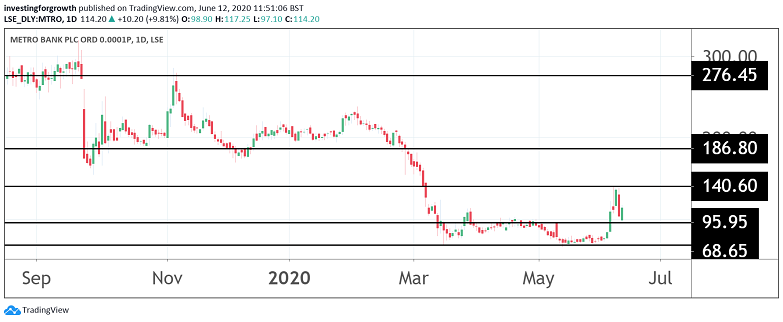Stockwatch: what odds on a genuine Metro Bank upturn?
After quickly doubling in value, our analyst rates prospects for the challenger bank’s shares.
12th June 2020 12:32
by Edmond Jackson from interactive investor
After quickly doubling in value, our analyst rates prospects for the challenger bank’s shares.

Have Metro Bank (LSE:MTRO) shares bottomed out now that a chart rebound has followed directors’ buying? Or is this £230 million “challenger bank” chiefly a high-risk macro play on markets and the UK economy in general – at the whim of how Covid-19 pans out, and greed/fear swings? It is certainly a prime example of how tricky stock picking has become.
After a long fall from over £40 in March 2018, the price tested 70p only a fortnight ago. However, on 11 May the chairman bought £13,715 worth of shares and his pension fund £62,069 worth, both at 78.37p; and on 6 May a non-executive director had bought £40,420 worth at 80.84p; the purchases made after Metro had issued a first-quarter 2020 update on 6 May.
Seemingly, they had less to do with a first quarter 2020 update that was robust but added no insight as to prospects under the virus, than dealing restrictions and two directors reckoning the price simply got too low.
- Stock market slump: reality check after grim data
- UK economy falls by a fifth – will easing lockdown kick-start growth?
Essential financial statistics seemingly affirm so. Yes, Metro is expected to stay loss-making – albeit on a reducing trend, for what forecasts are worth – but its end-2019 balance sheet had net assets near £1.6 billion, with loans and deposits in sound balance, and £591 million debt massively outweighed by close-on £3 billion cash. That would appear a margin of safety allowing Metro time, at least, to move into profit.
Investec shifts from ‘buy’ to ‘sell’ - should you worry?
Broker Investec's rationale is that even at 0.2x net tangible assets (its end-2020 estimate), the stock is no bargain if you have to wait until 2024 (so it believes) for any kind of profit. Yes, there are now 2 million customer accounts after the first branch 10 years ago, but Metro's re-gaining profitability is now much more problematic since its fiasco of loans re-classification in early 2019.
The bank needs to conserve capital for investment spend over the next three years, and also absorb an impairment charge during the first half of 2020. Hence, its net loan book has shrunk over the past four quarters and Investec, at least, does not expect growth to resume until 2021.
I judged that the stock was best avoided at around 800p in May 2019, but changed my stance to ‘buy’ at 207p last January, with the rationale of a new CEO taking radical actions on the cost and asset base, also the housing market seeing slow improvement. I targeted the stock to double to a circa 40% discount to net tangible assets.

Source: TradingView. Past performance is not a guide to future performance.
Unfortunately, the Covid-19 situation has thrown a spanner the works, while central banks’ colossal monetary easing measures, liable to continue, make it even harder for banks to make a worthwhile return. Interest rates are being kept artificially low and demand for commercial/personal loans is muted by the virus situation.
Investec believes this low interest rate environment, plus Metro’s existing format, means it is “structurally loss-making” despite three consecutive quarters of net deposit inflows. The bank has yet to rebalance its loan portfolio to enhance yield and is heavily underweight consumer lending.
Certainly, the macro context raises hurdles, though I would not jump to a conviction ‘sell’ stance when it's wholly unclear whether Covid-19 will entrench or steadily subside. Share buying early this week, that sent the price over 140p – currently about 110p – does, however, seem to reflect various hard-hit, higher risk stocks being seized by speculators.
2020 updates offer little towards a real grasp
A first-quarter update on 6 May cited slight 1% variability in loans versus deposits, each around £14.5 billion, their ratio 1% up at 101%. Customer requests for repayment holidays under the Business Interruption Loan Scheme were being respected, but the overall impact of Covid-19 was hard to predict.
Little had changed come the 26 May AGM statement which offered mainly resilient PR about all Metro banks and contact centres remaining open. With relatively low exposure to unsecured lending, record low interest rates and government intervention should “support continued repayment,” although “significantly higher credit risk impairments” are expected, “the actual quantum depending largely on the magnitude and length of the economic slowdown…(also) reduced transaction volumes which may result in lower fee income…”
So, we can anticipate some balance sheet hit, albeit against a fat cushion. Metro’s difficulty as a recovery share, in contrast say to banknote/security printer De La Rue (LSE:DLAR) I examined recently, is haziness as to when operations can reach a positive inflection point.
Principal ‘short sellers’ raise positions slightly
Another reason for this week’s rebound may have been hunting for “short squeeze” situations: a sharp increase in risk appetite generally, exposing stocks whose falls have been accentuated by short selling. Hamerson (HMSO), Premier Oil (PMO) and Tullow Oil (TLW) are prime examples, the most shorted stocks are also the highest risers lately. But I doubt that’s really the case at Metro, given what few disclosed ( over 0.5% of the issued share capital) institutional traders are involved, and smaller traders operating through the derivatives market of CFD’s and spread bets.
- Stock market rally poll: too much too soon?
- Chart of the week: my most important post for some time
- Take control of your retirement planning with our award-winning, low-cost Self-Invested Personal Pension (SIPP)
Odey Asset Management stands out having increased its short exposure by 0.25% of the issued share capital to 3.57% as of 28 April. Otherwise, Connor, Clark & Lunn edged its position up by a tiny 0.03% to 1.09% on 30 March. However, the overall short position in Metro has eased from 9.5% in February to 6.75% today.
This week has seen ENA Investment raise its position by 0.26% to 0.72% and Voleon Capital by 0.09% to 1.37%. Odey’s declared rationale is Metro being seriously affected by the Covid-19 situation, which is fair enough if the UK does indeed face the worst economic damage like the OECD contends, and also setbacks pit the road from lockdown.
| Metro Bank - financial summary | ||||||
|---|---|---|---|---|---|---|
| year ended 31 Dec | 2014 | 2015 | 2016 | 2017 | 2018 | 2019 |
| Turnover (£ million) | 75.4 | 120 | 195 | 294 | 404 | 422 |
| Operating profit (£m) | -48.9 | -56.8 | -17.2 | 18.7 | 40.6 | -131 |
| Operating margin (%) | -64.8 | -47.3 | -8.8 | 6.4 | 10 | -31 |
| Net profit (£m) | -41.1 | -49.2 | -16.8 | 10.8 | 27.1 | -183 |
| Reported earnings/share (p) | -51.2 | -61.3 | -21.8 | 12.6 | 28.3 | -124 |
| Normalised earnings/share (p) | -51.2 | -53.0 | -17.2 | 13.9 | 31.6 | -89.6 |
| Operating cashflow/share (p) | 1,009 | 680 | 1,522 | 2,670 | 160.0 | -1,123 |
| Capital expenditure/share (p) | 67.2 | 99.1 | 186 | 198 | 235 | 135 |
| Free cashflow/share (p) | 942 | 581 | 1,336 | 2,471 | -75.1 | -1,258 |
| Cash (£m) | 216 | 282 | 500 | 2212 | 2472 | 2989 |
| Net debt (£m) | 66.9 | 280 | 153 | -2,091 | -1,879 | -1,807 |
| Net assets (£m) | 462 | 407.0 | 805.0 | 1,097 | 1,403 | 1,583 |
| Net assets per share (p) | 576 | 507.0 | 1,001 | 1,240 | 1,440 | 918 |
| Source: historic Company REFS and company accounts |
Yet a worse-case scenario is just speculation
Even professors of epidemiology are hotly divided as to whether Covid-19 is on its way out – never mind any social distancing – or lurks for a second wave, destructive to livelihoods. If you fret over hedge funds shorting any stock you own, you might as not leave your house.
It makes sense for hedge funds running big assets to insure them with a mix of market index and stock-specific shorts. If such positions go wrong, their cost would be negligible in overall context, yet they mitigate downside risk. Shorting the most sensitive financial and oil stocks like Odey has done, makes good sense to manage a big asset base through high uncertainty.
If the UK and US experience virus re-infection and/or civil disorder, reduced bank lending and higher bad debts will follow. Just as bank shares are smart to buy in anticipation of economic recovery, typically they’re a geared play on a plunge.
Re-gaining poise amid high market volatility
A 7% fall in US stocks on Thursday has not followed through with further falls in London, with an initial drop tempting buyers again. Metro opened at around 96p, then shot up to 115p on circa 1 million shares traded (of 172 million issued) before consolidating at around 110p.
Near-term volatility is being dominated by sentiment swings on macro issues and risk appetite for very general classes of stock, so I would not read anything into Metro’s current chart, as to where the bank will be in 6-12 months.
Yet, while Covid-19 has damaged prospects, making a ‘buy’ stance potentially riskier even at half of January’s market price, a ‘sell’ rating assumes a worse-case UK economic scenario. Hold.
Edmond Jackson is a freelance contributor and not a direct employee of interactive investor.
These articles are provided for information purposes only. Occasionally, an opinion about whether to buy or sell a specific investment may be provided by third parties. The content is not intended to be a personal recommendation to buy or sell any financial instrument or product, or to adopt any investment strategy as it is not provided based on an assessment of your investing knowledge and experience, your financial situation or your investment objectives. The value of your investments, and the income derived from them, may go down as well as up. You may not get back all the money that you invest. The investments referred to in this article may not be suitable for all investors, and if in doubt, an investor should seek advice from a qualified investment adviser.
Full performance can be found on the company or index summary page on the interactive investor website. Simply click on the company's or index name highlighted in the article.
Disclosure
We use a combination of fundamental and technical analysis in forming our view as to the valuation and prospects of an investment. Where relevant we have set out those particular matters we think are important in the above article, but further detail can be found here.
Please note that our article on this investment should not be considered to be a regular publication.
Details of all recommendations issued by ii during the previous 12-month period can be found here.
ii adheres to a strict code of conduct. Contributors may hold shares or have other interests in companies included in these portfolios, which could create a conflict of interests. Contributors intending to write about any financial instruments in which they have an interest are required to disclose such interest to ii and in the article itself. ii will at all times consider whether such interest impairs the objectivity of the recommendation.
In addition, individuals involved in the production of investment articles are subject to a personal account dealing restriction, which prevents them from placing a transaction in the specified instrument(s) for a period before and for five working days after such publication. This is to avoid personal interests conflicting with the interests of the recipients of those investment articles.